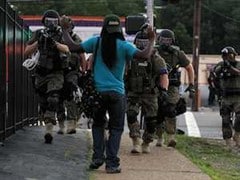Ferguson Police Chief Thomas Jackson, in a press conference notable for its brevity, identified the officer who shot Michael Brown as Darren Wilson, a six-year veteran of his department. Information distributed to the media included reports suggesting that Brown was a suspect in a strong-arm robbery of a package of cigars at a local convenience store. Still photographs, reportedly of the incident in the local QuikTrip, show a large young man resembling Brown involved in what appeared to be an assault on a much smaller individual in the store.
If Brown was a suspect in a crime of that kind, this case would have uncanny similarities to the 1974 incident in which another teenaged suspect, Edward Garner, was fatally shot while attempting to flee from a Memphis police officer following a burglary. As noted previously, that case went before the Supreme Court a decade later, resulting in the 1985 Tennessee v. Garner ruling in which the Court held that “The use of deadly force to prevent the escape of all felony suspects, whatever the circumstances, is constitutionally unreasonable.” This was a rejection of the “Any Felony Rule” under which officers in many states, including Tennessee, were authorized to use deadly force to stop a fleeing or resisting suspect.
The “Any Felony Rule,” it should be pointed out, didn’t enjoy universal approval, even in the supposedly barbarous 19th Century. In an 1858 editorial, the New York Times expressed alarm over the promiscuous use of lethal force by officers of the newly created NYPD against fleeing suspects: “The pistols are not used in self-defense, but to stop the men who are running away. They are considered substitutes for swift feet and long arms… [W]e doubt the propriety of employing them for such a purpose. A Policeman has no right to shoot a man for running away from him.”
The paper’s editorial board expressed concerns about “the policy of arming our Policemen with revolvers.” Today, of course, the thoroughly militarized NYPD is, as former Mayor Michael Bloomberg boasted a few years ago, the seventh-largest army in the world.
Disclosure of Officer Wilson’s name will increase public pressure for a criminal investigation into the shooting. However, there is still abundant reason to believe that the likely outcome of this matter will be a finding that Wilson — owing to his perception of the situation — acted justifiably under the “reasonable officer” standard. This may be complicated somewhat by eyewitness accounts that Brown was surrendering at the time he was fatally shot.
Chief Jackson claims that Wilson was “injured” in the reported struggle with Brown, and that he received treatment at a nearby hospital. No explanation has been provided for the fact that Brown, after being shot at a distance of about 35 feet from Wilson’s patrol vehicle, was left face-down in the street and received no medical attention. His lifeless body was eventually carried away in the back of an SUV.
Following several nights of protests and counter-insurgency warfare by the Ferguson PD, Missouri Governor Jay Nixon removed the Goon Squad and placed the Highway Patrol in charge of “public safety” in the city. The on-scene commander is Captain Ron Johnson, an African-American who was born and raised in the area.
One “emerging lesson” from Ferguson, apparently, is that after authorities employ the Iron Fist, they should quickly deploy people dressed in velvet gloves. Successful counter-insurgency operations, after all, require an effort to “win the hearts and minds” of the targeted population.
Reprinted with permission from LewRockwell.com.

